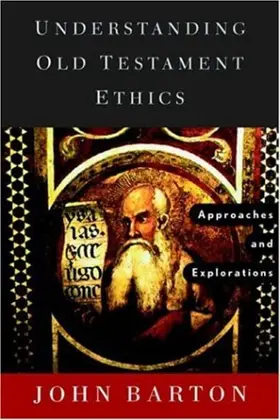

Understanding Old Testament Ethics: Approaches and Explorations
Pages
228
Publisher
Westminster John Knox
Published
3/1/2003
ISBN-13
9780664225964
Reviews
An important addition to a growing body of literature on the topic, this collection features Barton�s previously published essays (1978�2001) and includes a fresh introduction and conclusion. Some of the older essays are supplemented with a selective, updated bibliography. Equipped with scriptural and author indexes, this volume focuses primarily on biblical narrative and prophetic literature, with only scant attention devoted to the Law and the Writings. There is reason for such selectivity: the introductory and concluding chapters draw significantly from Eckart Otto�s Theologische Ethik des Alten Testaments (1994), which �says almost nothing about the Prophets ... or a bout narrative� (2). Barton�s collection addresses this gap. His introductory chapter makes an initial foray into the moral dimensions of biblical narrative, identifying specific challenges and pitfalls. For inspiration on method, Barton draws from literary critic Martha Nussbaum, whose works explore how narrative texts serve as vehicles for elucidating moral issues that are otherwise difficult to convey in other discursive genres.
[Full Review]
Whoever expects under this title an ethics of the Old Testament will be disappointed, because the author delivers already-published collected essays mostly of the 1970s and 1980s. This book was an opportunity for the author to republish his 1980 SOTSMS 6, Amos�s Oracles against the Nations, which was an expanded form of one chapter of his 1974 dissertation. This monograph is the key section of four contributions to a prophetical ethics of Amos, Isaiah, and Daniel as second part of the book. The first part collects articles related to methodological and principal problems of an Old Testament ethics that were published between 1978 and 1999. Not yet published are only the chapters of introduction, an Ethel Wood Lecture for 2000 at the University of London, and a conclusion�the only piece that is entirely new and the most important and decisive part of the book. It is throughout a critical discussion of the reviewer�s ethics of the Old Testament (see Eckart Otto, Theologische Ethik des Alten Testaments [Stuttgart: Kohlhammer, 1994]). The points of agreement are less important here than those of critical disagreement. Barton asks if the category of moral failure (� Scheitern�), which he thinks has n prominent function in my ethics, is a Protestant interpretatio moderna: �The theme of the Scheitern of human efforts at self-improvement through law and wisdom looks familiar to me from Protestant systematics, and one might wonder whether the Old Testament really recognizes it as centrally as Otto implies.� No author can deny his cultural background, also not a northern German Lutheran.
[Full Review]
John Barton�s expertise and exte nsive work in the area of Old Testament ethics within the broader discipline of Old Testament theology has been well known and received. This book brings together nine previous articles conveniently in one volume that spans thirty years of his best critical thinking. In the preface, he clarifies that no �full-scale updating of these pieces� was undertaken to prepare th em for this publication. Inclusive language and up-to-date bibliographies are two modifications that enrich especially the older material. The introduction and conclusion are newly written. Barton himself characterizes this collection as a �history of my thi nking on this subject.� In some sense, Understanding Old Testament Ethics sets a foundation or down payment for a future monograph that will represent his distilled and current thinking, as suggested both in the preface and at the end of his conclusion, particularly �a full-length volume on prophetic ethics which remains to be written.� The sequence has two parts: (1) Morality and Justice in the Hebrew Bible, and (2) Explorations in the Prophets. Barton�s in troduction, �The Moral Vision of the Old Testament,� effectively sets up his ongoing admiration and engagement with Eckart Otto�s Theologische Ethik des Alten Testaments (1994), whose analysis focuses specifically on law and wisdom as the building blocks of Israel�s moral teaching, excluding narrative and prophetic literature.
[Full Review]
